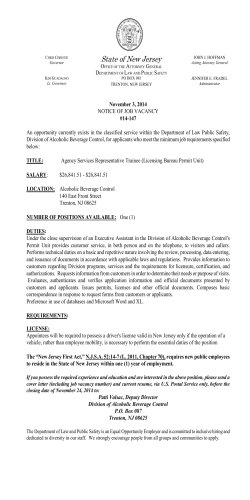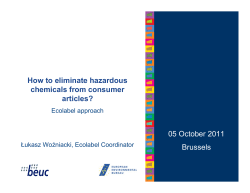
Consumers have the right to know what they are drinking
Consumers have the right to know what they are drinking (BEUC Letter sent to all Members of the European Parliament on 22 April 2015) Contact: Ilaria Passarani – [email protected] Ref.: BEUC-X-2015-040 - 22/04/2015 BUREAU EUROPÉEN DES UNIONS DE CONSOMMATEURS AISBL | DER EUROPÄISCHE VERBRAUCHERVERBAND Rue d’Arlon 80, B-1040 Brussels • Tel. +32 (0)2 743 15 90 • Fax +32 (0)2 740 28 02 • [email protected] • www.beuc.eu www.twitter.com/beuc - EC register for interest representatives: identification number 9505781573-45 Ref.:BEUC-L-2015-143/IPA/cm Brussels, 22 April 2015 Re: Consumers have the right to know what they are drinking Dear Member of the European Parliament, I’m writing to you on behalf of the European Consumer Organization (BEUC), in relation to the Motion for a Resolution on Alcohol Strategy that is going to be voted in plenary next week. In particular we would like to ask you to support the Resolution as adopted in the ENVI Committee especially with regard to the provisions on alcohol labelling. At present consumers can have complete information about what is in a bottle of milk or fruit juice, but not a bottle of whisky or beer. This is unacceptable. BEUC cannot see the reasons why alcoholic beverages should be treated differently from other beverages and exempted from the information requirements foreseen in the Food Information Regulation (EU) No 1169/2011. Providing consumers with adequate information enables them to make informed choices. In particular, providing consumers with nutritional information such as energy content allows consumers to better monitor their diet and maintain healthiness. This principle applies to all foodstuffs, including alcoholic beverages. The full list of ingredients - including additives and preservatives - and displaying nutritional information should be mandatory for all alcoholic beverages in order to help consumers make informed choices about what and how much to drink. The role that alcohol plays in nutrition and obesity is often overlooked. Alcoholic drinks are made by fermenting and distilling natural starch and sugar. Therefore they are high in sugar and contain a considerable level of calories. For instance our Belgian member Test-Achats found that a small porto (75ml) contained 8,1 grams of sugar, so as much as some flavoured milk drinks, while alcopops could contain up to 21 grams of sugar, almost the same as sugary drinks. High volume intake can significantly contribute to weight gain and obesity. Studies conducted in the UK indicated that alcohol accounts for nearly 10% of the calorie intake amongst adults who drink . Yet, few consumers know that one gram of alcohol contains 7 kilocalories, a large glass of red wine (13% alcohol) has 170 kilocalories and an average half litre of beer (5% alcohol) has about 220 kilocalories – comparable to a chocolate bar. Displaying accurate nutritional information on the bottle is essential to make sure consumers can make informed choices about the amount of alcohol they want to consume. Moreover, there are significant differences in the nutrient profiles as well as in the percentage of alcohol by volume (ABV) and non-alcohol ingredients among the different types of alcoholic beverages and also among different brands of the same product. Therefore, providing the list of ingredients and the nutritional information can facilitate comparison and choice between alcoholic drinks. We hope you will take these considerations into account and will support a meaningful Resolution that fully acknowledges the need to improve consumer information on alcohol. We remain at your disposal should you wish to discuss this further. With kind regards, Ilaria Passarani Head of the Food and Health Department 2
© Copyright 2026











